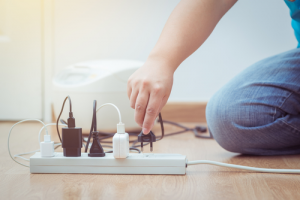Wondering why whole-house surge protectors have become so popular? If you or someone you know has ever suddenly needed to replace a big-screen TV or laptop because of power surge damage, it’s no mystery.
You should still use surge protectors at the outlets where you plug in electronics, but we recommend installing a whole-house surge protector at the breaker panel and/or at the meter. Ideally, you want a three-level approach to stop power surges from outside, surges from inside the home, and outlet surge protectors for the devices that need it most.
Power Strips vs. Surge Protectors: What’s the Difference?
Surge protectors and power strips are not the same thing! Plain power strips only give you more places to plug in. A surge protector has a small light that indicates the protective feature is working (often, the light is green when working and red when not).
Do Surge Protectors Really Work?
The quality of a surge protector can vary from product to product, but all of them should provide some level of safety for a limited amount of time.
Surge protectors use a “sacrificial anode” to provide their protection. Imagine playing a video game and your character gets a “shield” that wears off after getting hit a few times. The sacrificial anode will accept the blow of power surges that affect the outlet, so the surge doesn’t get passed on to your devices.
When shopping for surge protectors, you’ll notice ratings (in Joules) for how much electricity they can absorb. That’s why there is no expiration date or time limit for how a surge protector works—it just depends on how often and how large the surges are in your home.
Whole-House Surge Protectors
You probably don’t want to plug a surge protector into every outlet in your home (and if you did, you’d still have to replace them every year or two). As local electricians who have repaired damaged wiring, burnt electrical panels, and talked to people whose expensive devices have been ruined by power surges, we can attest that whole-house surge protectors are worth it.
- What devices need surge protection? Computers, televisions, and other electronics should be plugged into surge protectors because they are susceptible to damage and because they’re costly to replace. However, almost any modern appliance (dishwasher, refrigerator, LED light fixtures) should also be protected because they have circuit boards that can get permanently ruined.
- Does a whole-house surge protector prevent lightning damage? While it’s hard to guarantee that zero damage will occur if lightning strikes near your house, whole-house surge protectors do have the power to withstand lightning, power surges from the utility company, and other large forces.
- What about power surges from inside the home? Air conditioners, blow dryers, or anything else with a motor can send a power surge back to the electrical panel—and then to outlets throughout the home. This is why whole-house surge protectors are really important. They protect against the frequent, small surges inside the house and not just the rare lightning strike.
Whole-house surge protector installation must be performed by a licensed electrician. Power will need to be shut off briefly, and the device gets wired and grounded. Consider it a brief project and a worthwhile investment that will keep your appliances, phones, computers, and TVs from getting fried!

